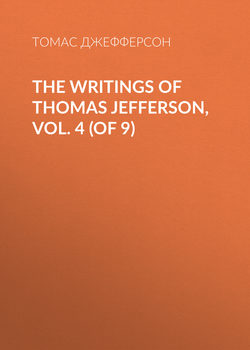Читать книгу The Writings of Thomas Jefferson, Vol. 4 (of 9) - Томас Джефферсон, Thomas Jefferson - Страница 64
TO JAMES MADISON
ОглавлениеMonticello, September 21, 1795.
I received about three weeks ago, a box containing six dozen volumes, of two hundred and eighty-three pages, 12 mo, with a letter from Lambert, Beckley's clerk, that they came from Mr. Beckley, and were to be divided between yourself, J. Walker, and myself. I have sent two dozen to J. Walker, and shall be glad of a conveyance for yours. In the meantime, I send you by post, the title page, table of contents, and one of the pieces, Curtius, lest it should not have come to you otherwise. It is evidently written by Hamilton, giving a first and general view of the subject, that the public mind might be kept a little in check, till he could resume the subject more at large from the beginning, under his second signature of Camillus. The piece called "The Features of the Treaty," I do not send, because you have seen it in the newspapers. It is said to be written by Coxe, but I should rather suspect, by Beckley. The antidote is certainly not strong enough for the poison of Curtius. If I had not been informed the present came from Beckley, I should have suspected it from Jay or Hamilton. I gave a copy or two, by way of experiment, to honest, sound-hearted men of common understanding, and they were not able to parry the sophistry of Curtius. I have ceased therefore, to give them. Hamilton is really a colossus to the anti-republican party. Without numbers, he is an host within himself. They have got themselves into a defile, where they might be finished; but too much security on the republican part will give time to his talents and indefatigableness to extricate them. We have had only middling performances to oppose to him. In truth, when he comes forward, there is nobody but yourself who can meet him. His adversaries having begun the attack, he has the advantage of answering them, and remains unanswered himself. A solid reply might yet completely demolish what was too feebly attacked, and has gathered strength from the weakness of the attack. The merchants were certainly (except those of them who are English) as open mouthed at first against the treaty, as any. But the general expression of indignation has alarmed them for the strength of the government. They have feared the shock would be too great, and have chosen to tack about and support both treaty and government, rather than risk the government. Thus it is, that Hamilton, Jay, &c., in the boldest act they ever ventured on to undermine the government, have the address to screen themselves, and direct the hue and cry against those who wish to drag them into light. A bolder party-stroke was never struck. For it certainly is an attempt of a party, who find they have lost their majority in one branch of the Legislature, to make a law by the aid of the other branch and of the executive, under color of a treaty, which shall bind up the hands of the adverse branch from ever restraining the commerce of their patron-nation. There appears a pause at present in the public sentiment, which may be followed by a revulsion. This is the effect of the desertion of the merchants, of the President's chiding answer to Boston and Richmond, of the writings of Curtius and Camillus, and of the quietism into which people naturally fall after first sensations are over. For God's sake take up your pen, and give a fundamental reply to Curtius and Camillus. Adieu affectionately.
